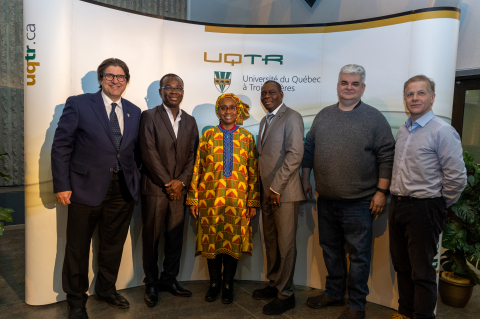
Press Release
Thursday, February 08, 2024
Establishment of the UNESCO Chair on Natural Resources in Africa and Sustainable Development

Photo : Christian Blanchette, recteur de l’UQTR; Armel Brice Adanhounme, professeur au Département de gestion des ressources humaines de l’UQTR; Idiatou Bah, professeure adjointe au Département de géographie de l’Université Laval; Alidou Ouédraogo, directeur du Département d’administration de l’Université de Moncton; Alexandre Croutzet, professeur à l’École des sciences de l’administration de l’Université TÉLUQ et Martin Dumas, professeur à la Faculté des sciences sociales de l’Université Laval (crédit : Audrey Phillips, UQTR).
View Full-Size Image
The scientific mission of the new UNESCO Chair on Natural Resources in Africa and Sustainable Development is to study sustainable development issues related to extractive activities on the African continent. The research team from Canadian and African universities, led by Armel Brice Adanhounme of the Université du Québec à Trois-Rivières (UQTR), will work together to develop solutions based on the social responsibility of companies in the extraction and management of natural resources.
In a global geopolitical context where Africa is at a crossroads between continuing with or breaking away from the Western development model and being challenged by the tempting alternatives offered by the BRICS countries (Brazil, Russia, India, China, South Africa), the natural resource management experience of Quebec and Canada could pave the way for a new beginning between Africa and its international partners.
"The co-development perspective that we are proposing within the framework of our Chair, in partnership with all industry players and in dialogue with researchers from the North and the South, seems to us to be a viable option for achieving sustainable development goals in the extractive sector in Africa. We are working to build this new bridge of research and action in the context of cohesion and equity in North-South relations," explained the holder of this new UNESCO Chair, Professor Armel Brice Adanhounme.
In addition to Professor Adanhounme, who initiated the project, the Canadian team is led by three co-investigators: Professor Alidou Ouédraogo of the Université de Moncton, Professor Martin Dumas of Université Laval, and Professor Alexandre Croutzet of TÉLUQ. In Africa, the Chair's research activities are coordinated by Professor Kefing Condé of Université Sonfonia (Conakry, Guinea), Professor Adama Traoré of Université des sciences sociales et de gestion (Bamako, Mali), Professor Sokhna Fatou Seck-Sarr of Université Gaston-Berger (St-Louis, Senegal), Professor Chrysal Kénoukon, Université d'Abomey-Calavi (Benin), Professor Marie-Thérèse Mbengue, Université Catholique de l'Afrique Centrale (Cameroon), and Professor Blanche Bissè Adoh, Institut Universitaire du Sud in Abidjan and Université PGC de Korhogo (Ivory Coast).
This initiative brings together academics, extractive industry stakeholders, and community organizations to propose a pragmatic approach aimed at putting an end to the "natural resource curse," which we associate with the negative consequences of mismanaging natural resources in Africa.
"It is the duty of academics to contribute to the eradication of poverty, the denunciation of injustice in governance and the protection of our natural resources, whether here or elsewhere, such as in Africa. In this sense, this new UNESCO Chair, the second in the history of the UQTR, will allow Professor Adanhoumne and his invaluable partners from Canadian and African universities to contribute to UNESCO's efforts to ensure sustainable peace and equitable development for communities," said Christian Blanchette, Rector of the UQTR.
"I add my voice to those of my colleagues in expressing my delight at the prospect of developing a Chair that is unique in that it relies on a diversity of expertise, cultural perspectives, and institutional alliances to develop and achieve its mission. May the harvest of its fruits in Africa exceed the promise of its flowers in Canada," said Martin Dumas, professor in the Faculty of Social Sciences at Université Laval.
Research Axes
Four disciplinary axes will shed light on these issues: the socio-anthropology of development, development law, natural resource economics, and critical stakeholder management. The intervention research methodology will encourage dialogue among all stakeholders to generate new knowledge and achieve sustainable development goals.
"Africa's natural resource economy faces critical challenges including overexploitation, conflict and environmental damage, compounded by inequitable income distribution. By adopting ethical practices, companies can promote sustainable resource use and stimulate economic and social progress. Examining these challenges and practices from an economic perspective will be one of the research focuses of the Chair," explained Alexandre Croutzet, Professor at the School of Business Administration at Université TÉLUQ.
"I am very excited about this prestigious UNESCO Chair. On a personal level, it will fulfill one of my areas of research, namely sustainable development in a perspective of sharing experiences and co-construction between Canada and Africa. On an institutional level, this Chair will consolidate and enhance the expertise of researchers in the Faculty of Administration and strengthen the reputation and quality of research at our university," added Alidou Ouedraogo, Director of the Department of Administration at the Université de Moncton.
Objectives
The objectives of the Chair include involving local players in understanding their development needs, creating links between corporate social responsibility programs and sustainable development objectives, and transforming organizational practices to promote equitable sharing of the benefits of development projects in Africa.
The approach also aims to improve the living conditions of disadvantaged communities in a co-development perspective, thus enabling local communities to obtain their fair and equitable share. Extractive companies will also benefit from this collaborative approach to sustainable development goals, as the theoretical insights provided will enable them to address issues of identity, management, project contestation and localization in a straightforward manner.
About the Chairholder
Armel Brice Adanhounme is Full Professor of Industrial Relations in the School of Management at UQTR. His research, funded by the Social Sciences and Humanities Research Board, focuses on how the governance of firms and organizations is influenced and shaped by culture, laws and norms in labour relations, and subsequent issues of democracy and citizenship in the workplace, both in the context of northern liberal economies (Canada) and post-colonial Africa.
Return to Press release


